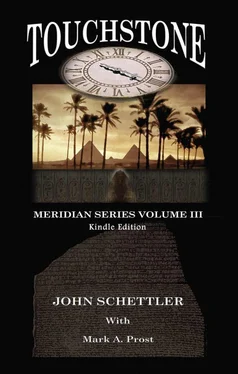I’ve tipped brandy with two Prime Movers, he thought. God only knows what I’ve accomplished. He hurried away from the club, drawing his overcoat close about him against the evening chill. He wondered who actually won the competition in the time line he had come from. He had a 50-50 chance of choosing the same verdict if he could have just mustered the guts to hazard a guess. His solution, awarding victory to both of the contestants, had been clever, but was it wise?
And again, he realized that the man, or woman, who had actually served as judge in the original Meridian, had been unduly robbed of that moment by his interference. While it seemed an insignificant thing, that was exactly the sort of contamination that Paul always warned him about. It was not the great things, but the inconsequential ones that set the wheels of time to turning.
Off in the distance he heard the dull toll of a church bell timing out the half hour, and it gave him little comfort. Some time later, he made it back to his hotel. He had another 24 hours, in this Meridian, before his retraction scheme pulled him out. He needed sleep to gather his wits for the real intent of his journey, but the thought that he had already set the world to havoc with a toast of brandy kept him restless and tossing all through the night.
“What Can we know, or what can we discern,
when error chokes the windows of the mind?”
—Shakespeare:
The Merchant of Venice
He stood gazingup at the colossal red granite Horus looming six cubits over him. Nordhausen had seen this before in photographs. The god was 5000 years old already and would live forever. The building housing him was barely one hundred years old, and would one day be dismantled or fall into ruins, but Horus would remain. These islanders were wrangling rudely shaped megaliths into circles when Horus was sculpted 2181 miles away, the distance of the hypotenuse of the 1500 mile square, Sacred Jerusalem with Gizeh at one corner and London at the other. He was as perfect, smooth, curved, beaked and taloned, as he had been in Karnak. He had last been worshipped in the desert 1500 years ago, by an Ethiopian who had made a pilgrimage.
In ancient times, the Egyptians had seeded the earth with gods, and slowly, slowly, they were dispersing throughout the world. Perhaps someday, when the right obelisk was installed in the right cosmic vortex, who knew what long planned harmonic convergence might ensue?
The professor smiled to himself, pleased that he was finally busied with the real work of his time jaunt. The revelry of the previous night was still shrouding over him like a hangover, but what was done, was done. He was here and there was nothing else to do but make the most of things with the time that remained to him. He had dropped off his formal wear this morning at Madame Tussaud’s on King Street, redeemed his deposit, had a spot of breakfast at a street café, and now he was here—at the British Museum.
Nordhausen’s musings were interrupted by the arrival of a governess and a small girl, very well dressed in deep blue velvet and black satin, eleven or twelve years old. The governess was paging through a guidebook, while the little girl solemnly looked up at the huge raptor, perching still and tense.
“This is a pagan god of the Egyptians, dear. It was captured from Boney, and brought to our island.”
“I wonder what it means,” the girl said, and ran her hands over a column of deeply incised hieroglyphics.”
“No one knows, dear, it is all a great mystery. It says here that the last people to use hieroglyphics died almost eighteen hundred years ago.”
Nordhausen was somewhat surprised by the woman’s remark. He knew he should keep his mouth tightly closed, but what harm could come from a little pleasant conversation? “Why, not at all,” he said. “This is the god Horus in the form of a falcon. See, here is the name of the pharaoh Rameses, who built this statue.” He pointed to the royal cartouche, and spelled out, “Ra-me-ses. This circle with the dot is Ra, the sun god. This funny knot is the symbol ‘mose’, which means ‘to give birth,’ so it stands for ‘M’, and these two hooks are S’s.”
The girl put her fingers on the hieroglyphics, and slowly traced, “Ra-me-ses.”
“Oh, sir,” interrupted the governess, “How is it possible that you would know all this? It’s an evil looking thing, that much I’ll give you. Has an unholy look about it, yes?”
“Unholy? I dare say, Madame. There is nothing holy about it. In fact, the Egyptians were quite fond of human sacrifice at one point, and I suppose this monument here has seen its fair share of blood through the ages.”
“My word! To speak of such things before an innocent child! Don’t touch, Marie! Come along now.” She grabbed the girl firmly by the arm, and hurried her out of the gallery, leaving little more than a frown in her wake.
Well I’ve done it again, thought Nordhausen as he mentally kicked himself. Suppose they were going to take the whole tour of the museum and I’ve gone and spoiled it all for them. Suppose the little girl was to find some glowing inspiration here that sticks in her mind and feeds the fires of her imagination—and now I’ve gone and put them out. Damn it man, when will you learn to keep your bloody mouth shut?
Angry at himself again, Nordhausen decided to go in the other direction. He resolved not to get involved with anyone else, if at all possible. He would just mind his own business and be done with this trip. As he sauntered towards the far end of the hall, he glanced at the cards on some of the displayed items. They were very curious, even for this curious world he found himself in. Not a single one identified the item, beyond a general description: Sandstone Goddess; Memorial stele; Porphyry pharaoh, from Luxor.
Nordhausen began to get a gnawing feeling in the pit of his stomach. He began to look at every single item around him. Nothing was dated, nothing was identified. He could read a number of royal cartouches on various objects, and recognized Rameses, Thuthmose and one or two vaguely familiar others, on various statues, but none of them was named on the placards.
Something was very wrong. It was nearly a hundred years after the discovery of these objects by Napoleon during his expedition to Egypt in 1799. By now several scholars should have worked out the details of the hieroglyphics: Ackerbad and Silvestre de Sacy in 1802, and the initial work of Thomas Young on the deciphering of the Rosetta Stone itself. It was Young who proved that the proper names in the hieroglyphics section of the stone did, in fact, have phonetic values, and were not merely symbols, as had been hypothesized earlier. He then introduced the idea of the proper names being inscribed with ovals around them, known as cartouches.
Nordhausen didn’t expect the testy governess to know such things, but surely the Curator of the museum should know all this by now. Young’s main contribution to Egyptology was published in the 1824 Encyclopedia Britannica. The work of the French scholar Champollion would follow up on this thesis and do much in the way of explicating the hieroglyphics. But nothing was named here.
He stood in the middle of the empty hall, surrounded by huge, mute stone gods and kings, dully lit in the gray afternoon light that streamed in from the high windows. He heard the rushing of his blood, the loudest sound in this vacant room.
Recrimination vexed him, and the awful thought that he was somehow responsible for the unexpected change preyed upon him. But what could he have done to accomplish this? Surely not his innocent spat with the governess just now. He hadn’t done anything … partied with a bunch of swells last night, but that couldn’t have done this. What was going on?
Читать дальше












